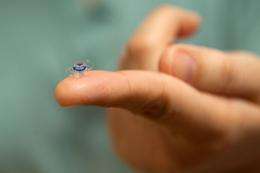The implantable miniature telescope can improve central vision for those with end-stage macular degeneration. Credit: Steve Zylius / University Communications
(Medical Xpress) -- Two UC Irvine ophthalmologists are the first in Orange County to implant a miniature telescope in the eyes of patients with end-stage age-related macular degeneration, the leading cause of blindness among older Americans. The device restores a portion of vision lost to the disease. UC Irvine’s Gavin Herbert Eye Institute is the sole facility in Orange County and among only a few nationwide to offer this new technology.
In December, Dr. Marjan Farid implanted the 4-millimeter telescope in the left eye of an 85-year-old Irvine woman. In May, Dr. Sumit “Sam” Garg implanted the device in a 94-year-old Anaheim resident’s right eye.
“Macular degeneration damages the retina and causes a blind spot in the center of a person’s field of vision,” said Garg, medical director of The Gavin Herbert Eye Institute. “The telescope projects an image onto an undamaged portion of the retina, making it possible for patients to recognize faces, read and perform daily activities.”
Clinical trials demonstrated that the implant, in addition to improved vision, increases patients' independence. It also aids social interaction by making visible the facial expressions of family and friends.
“Until now, there has been no mechanism, surgical or medical, to restore that central sight,” said Farid, UC Irvine’s director of cornea, cataract and refractive surgery. “These patients are now experiencing a quality of life that they’ve not enjoyed in many years. My patient is seeing her son’s face for the first time in more than a decade.”
The Food & Drug Administration approved the miniature telescope last year for use in patients with irreversible end-stage macular degeneration. At least 15 million Americans are affected by some form of the disease. The implant cost is covered by Medicare. The device is integral to CentraSight, a new patient care program developed by VisionCare Ophthalmic Technologies.
In addition to cornea surgeons Garg and Farid, the CentraSight team includes Dr. Baruch Kuppermann and Dr. Stephanie Lu, Gavin Herbert Eye Institute retina experts who coordinate the treatment; and vision specialists at the Mary Ann Keverline Walls Low Vision Center at the Southern California College of Optometry, who handle pre- and postsurgical therapy. Kuppermann conducted trials of the telescope at UC Irvine prior to its FDA approval.
After surgery, implant patients work with the vision specialists to retrain their brain to recognize images projected through the device.
Provided by University of California, Irvine





















